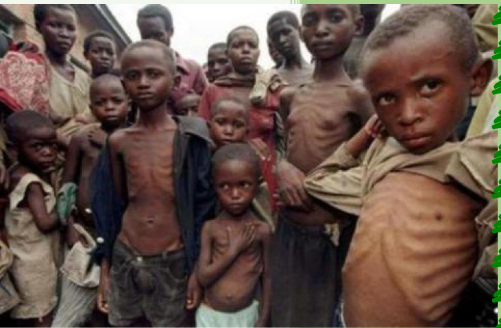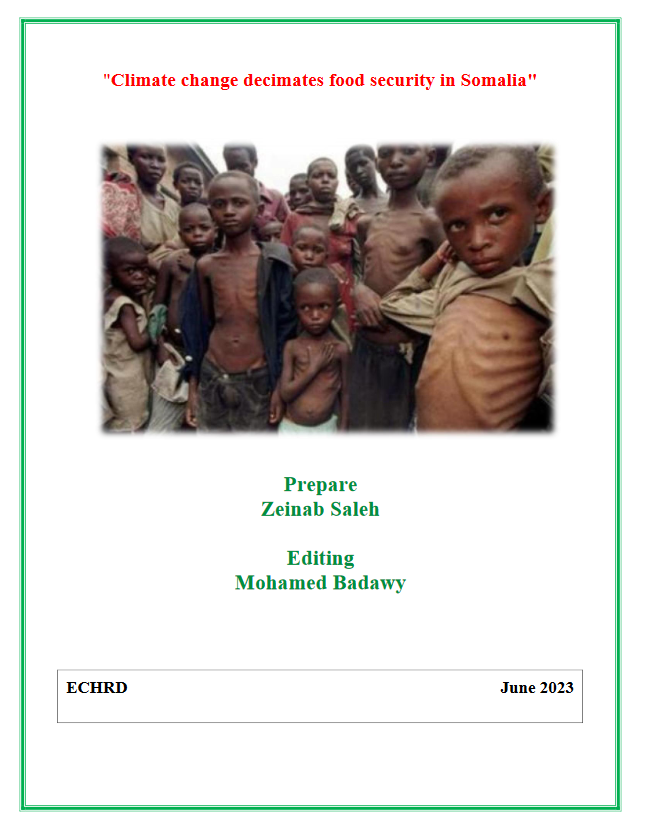Press Release
………………………………………………………….
Today, Thursday, 1/6/2023, the Egyptian Coalition for Human Rights and Development issues its report “Climate Change decimates Food Security in Somalia”, which discusses the impact of climate change on food security in Somalia through several axes:
- Definition of food security.
- Definition of climate change.
- Causes of climate change.
- Repercussions of climate change in Somalia, especially on food security.
- Models of malnourished children in Somalia.
- African and international efforts to adapt to the effects of Climate change and confronting food insecurity.
- Recommendations.
Rising temperatures, changing rainfall patterns, rising sea levels, and growing drought in Somalia are negatively affecting the humanitarian conditions of the country’s population, which suffers from widespread poverty rates and high numbers of people affected by famine. As well as high rates of displacement and asylum due to environmental damage, and the spread of epidemics. The issue of food security is one of the important issues and one of the main problems facing Somalia, especially in light of climate change, which leads to a shortage of Water, available agricultural land, affecting widespread hunger and food shortages, increased health threats, environmental degradation and pollution.
A report by the United Nations Humanitarian Relief Information Network described Somalia’s current water scarcity as a “historic drought” and explained that in December 2022, Somalia had entered its fifth drought year and that the lack of rain forced millions of Somalis to flee their areas of residence, and the lack of rain destroyed grazing, dairy production and the meat industry. Somalis are suffering from difficult living conditions and food prices are out of reach. At least 15 million Somalis are facing problems accessing food, and 300,000 Somalis are at risk of famine in Somalia’s driest Bay region, the report said. The number of Somalis affected by drought increased from 2-3 million in December 2021 to 7-8 million in August 2022, and it is estimated that 43,000 people died in Somalia due to drought last year, while the United Nations reports that 22 million people are at risk of hunger in Ethiopia, Kenya and Somalia.
Between January and March 2023, nearly 5 million people across Somalia suffer from worse levels of acute food insecurity, including 96,000 people facing catastrophic hunger. 6.5 million People – more than a third of the total population – are expected to face worse levels of acute food insecurity between April and June this year.
The UN also expects famine to be declared soon in three isolated areas of Somalia, and the classification is for areas where at least a fifth of households face severe food shortages. At least 30% of children are acutely malnourished, and at least two out of every 10,000 people die every day from hunger or a combination of hunger and disease caused by drought and climate change.
The report concluded with the following recommendations:
- The need to make radical changes in the current agricultural and water policies that focus on giving the greatest attention to accelerating the growth rate in agricultural productivity, in addition to doubling spending on agricultural research, especially research related to the production and development of varieties, especially drought and heat-resistant varieties and water-saving varieties, in addition to improving animal breeds, providing veterinary care and developing fisheries.
- To avoid the negative effects of temperature increase on productivity, it is necessary to work on planting high-productivity crops and redistributing crops to their growing areas and planting at optimal dates.
- Renew the commitment of the international community to support agriculture, livestock production and fisheries in Somalia, and increase the amount of funds allocated for this, as investment in agriculture enhances the resilience of poor farmers and helps reduce hunger and poverty levels, especially as this country is exposed to waves of extreme climatic fluctuations between drought and flood.
- Work to increase environmental awareness and reduce illiteracy rate among the population to confront climate change, adapt to what occurs as a result of it, and exploit resources in a rational manner to preserve them from degradation.
- Agricultural planning that the State attaches special importance to the development of future agricultural plans, especially long-term and medium-term, and directing investment towards productive activities that serve the trend towards achieving food security.
- Develop a plan to deal with any shortage or increase in water resources, and rely on renewable energy sources from solar and wind energy.
- Attracting more investments and climate finance opportunities, and strengthening private sector partnership in financing green activities.
- Banning pesticides and chemical fertilizers in agriculture, and moving towards natural alternatives and permanent organic agriculture.
- The agricultural pattern is modified by making agricultural cycles suitable for climatic patterns, and recycling waste properly.
- Rationalization of the consumption of natural resources, and educating citizens about the dangers of climate change.








